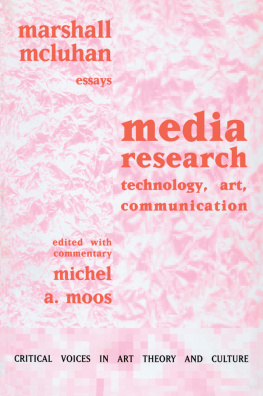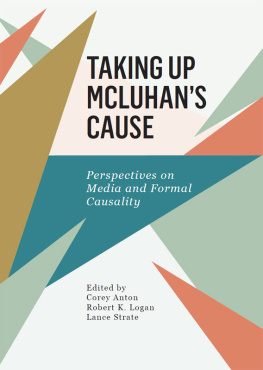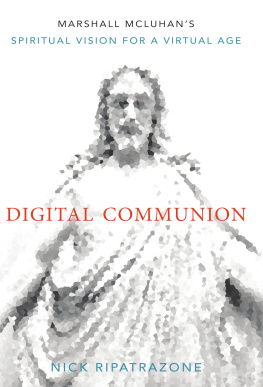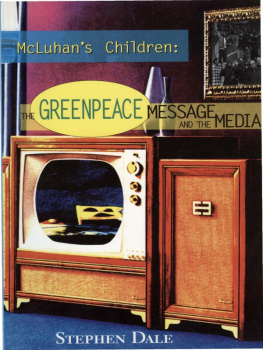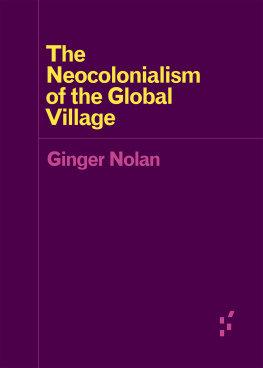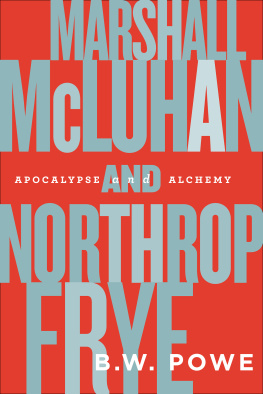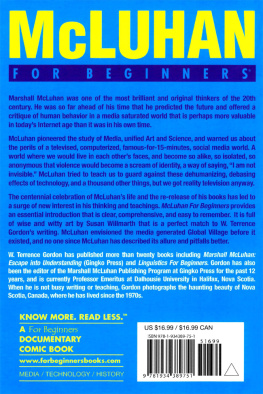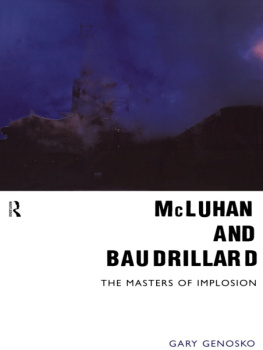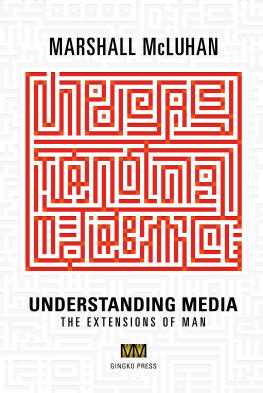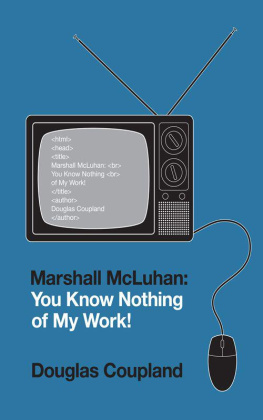Acknowledgments
My first thank you acknowledges all those authors who have written about Marshall McLuhan. Whether or not I am in agreement with what came before, those authors and their ideas form the broader ground for my volume.
I owe a great debt of gratitude to my home university Alma Mater Studiorum Universit di Bologna, and to my colleagues and staff at the Dipartimento di Lingue e Letterature Straniere Moderne and the Facolt di Lingue e Letterature Straniere. Together, they constitute an enriching environment in which to work and learn. I am grateful to the late Giovanna Franci, who supported this project at the beginning and who passed away too soon and unexpectedly. I am very grateful to Cecilia Ghetti for her outstanding support and help with this work. I am also very indebted to my students, who enthusiastically continue to prove that literature is not a subject but a function inseparable from communal existence, as per McLuhans lesson. In particular, Im grateful to Giulia Albertazzi, Giulia Del Pittore, Alessandra Mastroianni, Monica Rossi, Tommaso Santi, and Margherita Suardo, whose engaging participation in my class on Literature, Art, Communication: Marshall McLuhans Mosaic in the academic year 20089 renewed my enthusiasm.
Some of the research for this book was developed as part of an international project called The Marconi Galaxy: Technology, Culture, Myth-making, generously co-sponsored by the Institute for Advanced Studies at the University of Bologna, the Guglielmo Marconi Foundation (Bologna), the Italian Cultural Institute (Toronto), the Robarts Centre for Canadian Studies (York University, Toronto), the Mobile Media Lab (Concordia University, Montreal, and York University, Toronto), and the Social Sciences and Humanities Research Council of Canada. I extend my gratitude to these collaborating institutions, to their directors, and to the colleagues who took part in the project: Dario Braga, Maria Cioni, Barbara Crow, Gabriele Falciasecca, Seth Feldman, Giuliana Gardellini, Cecilia Ghetti, Michael Longford, Sanja Obradovic, Robert Prenovault, Kim Sawchuk, Martin Stiglio, and Barbara Valotti.
The celebrations for the centenary of Marshall McLuhans birth provided an additional opportunity to assess the ideas discussed in this book. I am grateful to all involved in the European and international network McLuhan100. I owe a collective debt of gratitude to the team of colleagues involved in the events we hosted in Bologna, with the assistance of the Canadian government and with the outstanding support of the Canadian embassy in Rome: Giovanna Cosenza, Mirco Dondi, Roberto Farn, and Paolo Granata. I am very grateful as well to the doctoral students whose work facilitated the organization of all our events in Bologna: Roberta Cadei, Alice Casarini, Francesco Barbieri, and Monica Rossi. My gratitude goes to all convenors and fellow panellists at the McLuhan100 events, which I was lucky to attend in Canada, the United States, and Europe. My special thanks to Marco Adria and Katherine Adams (University of Alberta, Edmonton), and to Stephen Kovats and Michelle Kasprzak (Transmediale, Berlin).
Many humanists have guided me throughout this project. It was both delightful and revealing to discuss with them todays role of the humanities. Linda Hutcheons comments on the volume prospectus offered the most generous encouragement one could expect at the beginning of the writing adventure. Max Saunders, Jason Harding, Paul Edwards, Alan Munton, and Brett Neilson offered fundamental help at different stages. Paul Hjartarson, Linda Morra, Adam Hammond, Wayne DeFehr, Gregory Betts, Paul Tiessen, and Kristin Fast formed a great modernist team at the MEA Conference, University of Alberta, 2011; it was an honour to join their group and to discuss McLuhan and modernism with them. I could rely on Peppino Ortoleva, Dominique Scheffel-Dunnand, Gerald OGrady, and Domenico Pietropaolo to provide solid criticism and intellectual interaction, helping me figure out a series of uncanny questions. Melba Cuddy-Keane and the MRRG group at the University of Toronto welcomed me at their series of seminars, where I could learn from them while sharing my ideas on modernism and media studies. Thank you to the faculty and staff of the Department of English, University of Toronto, and to the staff at the Robarts Library, who facilitated my research and my academic life in Toronto. Master John Fraser of Massey College has offered support through deeds and encouraging words on many occasions since 1997, when I first landed in Canada. I owe him, his wife, Elisabeth, Massey College, and all Masseyites a great deal. And also since 1997, Barry Callaghan and Claire Weissman Wilks have offered both intellectual and emotional shelter to me constantly and with great generosity. From them, I have learned much about Canada, and the Canadian and international literary and artistic scenes. Grazie.
I am also very grateful for the institutional support I received from York University, and especially from the Robarts Centre for Canadian Studies, under the direction of Daniel Drache and Seth Feldman. In addition to Daniel and Seth, I want to thank all the colleagues at York with whom I have discussed my project over the past five years: Gabriella Colussi-Arthur, Julia Creet, Chris Doda, Robert Drummond, Vicky Drummond, Rishma Dunlop, Shelley Hornstein, Janine Marchessault, Ron Pearlman, Roberta Sinyor, Priscilla Uppal. Thank you to the staff of the Scott Library, for welcoming me and assisting me all through this project. My special gratitude goes to Clara Thomas and John Lennox, who were the first to welcome me at York University; they made me feel at home from the very first day. I am particularly grateful to B.W. Powe, also at York University, for his comments and feedback on an earlier version of this book: his acute criticism helped to better focus my writing and ideas. Grazie Bruce!
Coming from the literary planet, Lance Strates generous lessons on media ecology and media studies offered me a way out of the theoretical labyrinth more than once. I am very grateful to him and to all the colleagues at the Media Ecology Association who have patiently listened to my artsy investigations, sharing comments and criticism. Lance also introduced me to general semantics and the work of Alfred Korzybski; there is some interesting overlapping between McLuhans ideas on language and those of Korzybski, but they have not been discussed in this volume. On the Binding Biases of Time, Lances book, offers a great kick-off for further investigations in that direction (and much more).
In Toronto, I am particularly grateful to Adriana Frisenna, Italian Cultural Institute, and all the staff of that institution for their constant support and encouragement. My gratitude also goes to all those with whom I have shared conversations and ideas while working on this project in Canada, in particular, Guido and Anna Condotta, Maria, Mark, and Rafi Lewis, Rosemarie Nielsen, Irani and Francis Zarb, Joyce and Tony Santamaura, Caroline and Alberto Di Giovanni, Hege and Emanuele Lepri, Alorani and Cecil Hahn, Konrad Eisenbichler, Patrizia and Umberto Villani, Giorgio Mitolo, and Tony and Cristiano De Florentis. Jane Freeman helped enormously on Shakespeare and his treatment of the Fool, as well as being a very passionate friend and colleague. Peter Eliot Weiss and Michael Sweeney were constant points of reference, always finding time to listen, answer, ask, and provoke. Grazie.
I reserve a special thought for Eric McLuhan, who has incessantly taught me a lot, not only about Marshall but also about literature and the humanities, providing new, fresh, and often amusing insights on so many different narratives. Thank you also to Stephanie McLuhan, who read and commented on the volume prospectus, and to Michael McLuhan for his generous help with sources and ideas.


